RPAS(Rear Parking Assist
System) is an electronic driving aid device warning driver to be cautious
during parking or low speed when after detecting an object on side and
behind of vehicle by using the feature of ultrasonic waves.
RPAS consists of four
RPS sensors which detect the obstacles and transmit the result in three
separate warning levels, the first, second and third to BCM by LIN
communication. BCM decides the alarm level by the transmitted
communication message from the slave sensors, then operate the buzzer or
transmits the data for display.
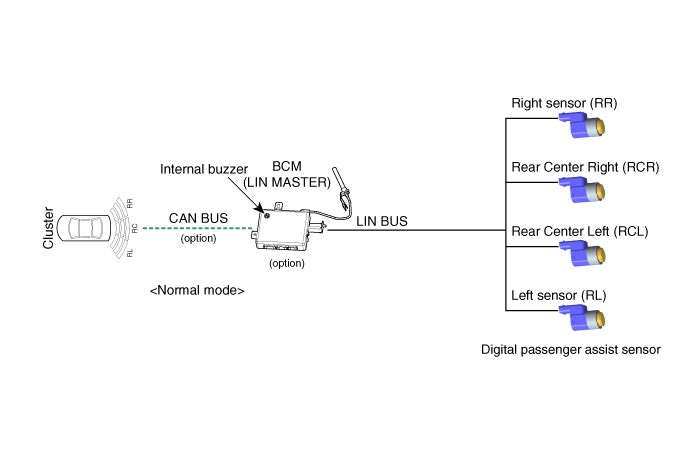
System Block Diagram
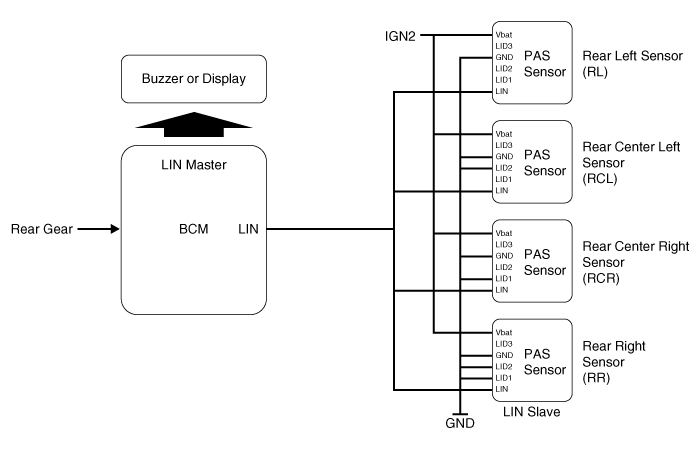
System Operation Specification.
| 1. |
INIT mode
| (1) |
System initializing time is 500ms after
IGN1+ R Gear. |
| (2) |
RPAS recognizes ID and sets the sensor
ID up during initialization. |
| (3) |
RPAS activates each sensor and then
executes the diagnosis after finishing initialization of
BCM |
| (4) |
RPAS Starting buzzer” is normally
worked, when sensor does not send an error message and after
finishing error diagnosis. |
| (5) |
If any failure is received from the any
sensors, RPAS Starting Buzzer” does not work but the failure
alarm is operated for a moment.
If you have display option, warning sign
is also shown on it. |
| (6) |
Buzzer for sensor failure is operated
once, but display is shown continuously until it is repaired
completely. | |
| 2. |
NORMAL Mode
| (1) |
LIN communication starts and keeps the
routine after IGN1 ON+R gear |
| (2) |
BCM send a message once to each sensor
for operating request to check the initial status of the
system and four sensors response at a time. At this time, if
there is no problem, the alarm starts after 500ms of R gear
shifting at 300ms intervals. |
| (3) |
After initialization, normal mode starts
100ms later after finishing alarm
output. |
| (4) |
Alarm for obstacles is divided into 3
levels.
The first and second are intermittent
sound, and the third alarms
continuously |
| (5) |
The efficient vehicle speed of RPAS
operation is under 10Km/h. |
| (6) |
Refer to ‘Digital PAS Project LIN
communication’ for the more detailed communication
specification. | |
Sensing Area
| 1. |
Measurement condition – PVC pole (diameter
75mm, length 3m), normal
temperature |
| 2. |
Distance range detected objects (Measured
directly in front of sensor)
81cm(31.9in) ~ 120cm(47.2in) : ±
15cm(5.9in)
41cm(16.1in) ~ 80cm(31.5in): ±
15cm(5.9in)
Less than 40cm(15.7in) : ±
10cm(3.9in) |
Horizontal Sensing Area
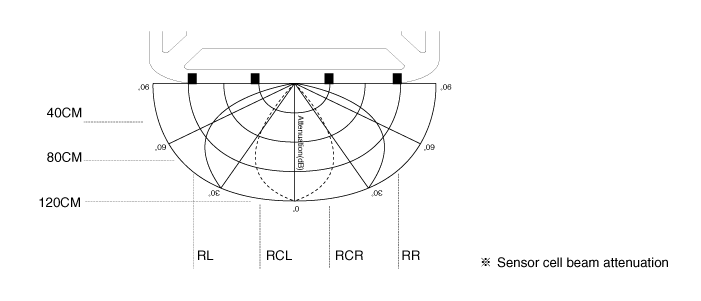
Vertical Sensing Area
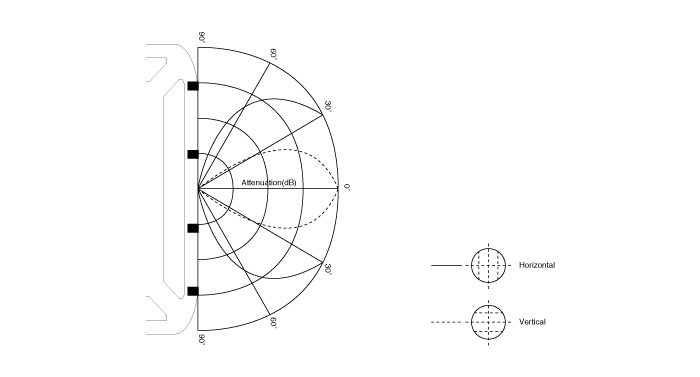
Distance Measurement
Transmission and
Reception are executed with one sensor
(RL, RCL, RCR, RR each
sensor execution)
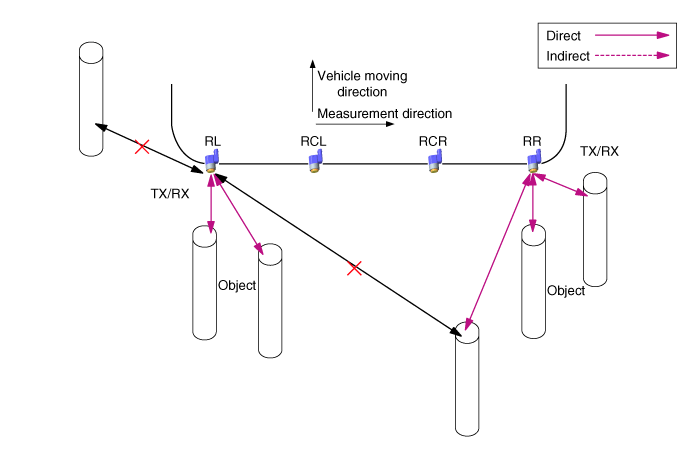
(RCL → RL, RCL → RCR,
RCR → RCL, RCR → RR Execution in order)
With two or three
sensors, one of them sends the transmission and the others get the
reception.
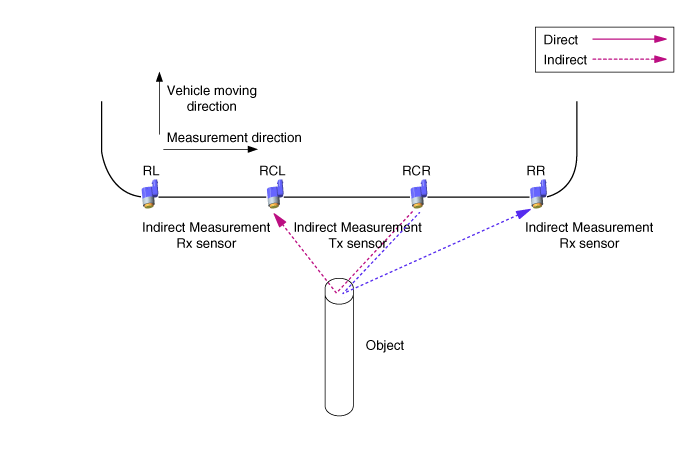
| Direct and Indirect
Measurement at once |
With two or three
sensors, the one sensor performs both transmission and reception, and the
others perform only reception.
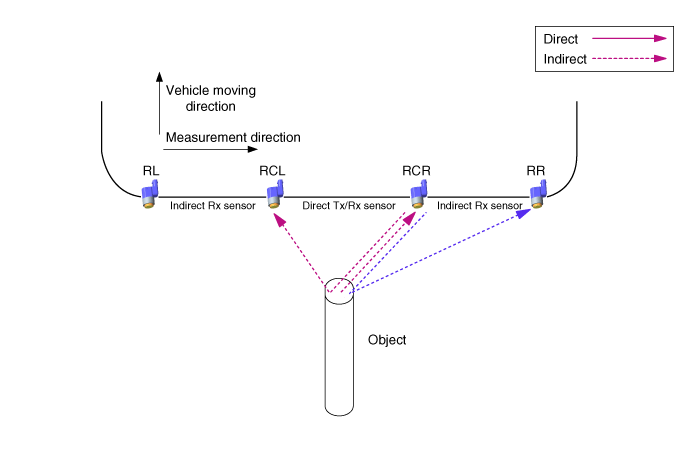
RPAS alarm system
When the RPAS sensor
detects the object, warning is operated by audible alarm device as like
buzzer. RPAS sensor sends data to BCM with LIN communication and BCM
implements audible warning for each RPAS SENSOR by priority. And it
performs a role of gateway only when it sends visible alarm device such as
Cluster.
| - |
Sensor buzzer/display information processing
method of BCM In case of RL/RR sensor information, the BCM handles
each sensor information directly about Display and buzzer output
function. Buzzer output of CL/CR sensor, BCM handles center
combination information by priority both
sensor. |
System Operation Spec
When the system has the
power (after IGN ON and R gear), MICOM checks every sensor channel. In
case it is not find any error, it sounds 300ms buzzer 500ms afterward. But
it finds any error even a sensor, it sounds buzzer corresponding fault
sensor instead of initial starting alarm. Function for normal mode
entrance is as below
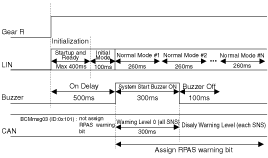
With R Gear, system
function is as below
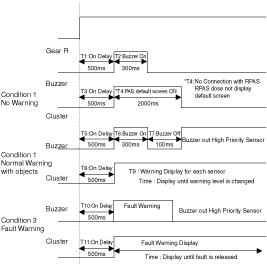
With R gear releasing,
system function is as below
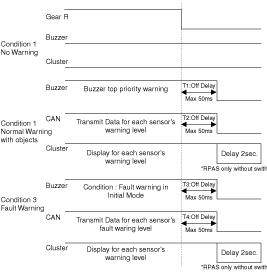
※acceptable error range
on waveform ±10%
Alarm Output Specification classified by
distance between sensors
Condition logic
according to priority of alarm level is as below. (the identical
sensor)
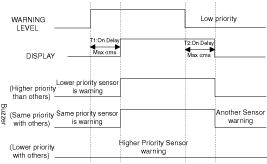
*α value
definition
| 1. |
low priority sensor off : α =
0ms |
| 2. |
low priority sensor is 1st warning level : α
< 340ms |
| 3. |
low priority sensor is 2nd warning level : α
< 170ms |
*β value
definition
| 1. |
low priority sensor is 1st warning level : β =
1700ms |
| 2. |
low priority sensor is 2nd warning level : β =
1700ms |
| 3. |
low priority sensor is 3rd warning level : β =
700ms |
Alarm control by sensing
distance is as below
| 1. |
First warning area (81cm ~ 120cm)

|
| 2. |
Second warning area (41cm ~ 80cm)

|
| 3. |
Third warning area (less than
40cm)

|
| 4. |
Period of fault alarm
| (1) |
With visible display

|
| (2) |
Without visible display
When the system has error channel in
initial time, sensor channel notify the location of error via
hearing device. (Three times for each sensor)
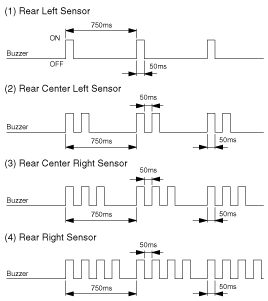
| 1. |
Time tolerance of the above
waveform : Time ± 10%
|
| 2. |
At nearer distance than
30cm, detection may not
occur. |
| 3. |
Alarm will be generated with
vehicle reversing speed of 10km/h or less.
|
| 4. |
For moving target, maximum
operation speed shall be target approach speed of
10km/h. |
| 5. |
When the vehicle or the
target is moving, sequential alarm generation or
effective alarm may be failed.
|
| 6. |
False alarm, or failure of
the alarm to trigger may occur in the following
conditions. |
| - |
Irregular road surface,
gravel road, reversing toward grass.
|
| - |
Horn, motor cycle engine
noise, large vehicle air brake, or other object
generating ultrasonic wave is near.
|
| - |
When a wireless transmitter
is used near to the
sensor. |
| - |
Sequential alarm may not
occur due to the reversing speed or the target
shape.
| | | |
Error Handling
Section
|
Error recognition
condition
|
Error releasing
condition
|
Initial
Routine
|
LIN BUS OFF
sensing once
|
Error is not
released in initial mode.
|
Normal
Routine
|
LIN BUS OFF is
sensed times in a row
|
The fault is
released when BCM or LIN Master senses LIN BUS ON four times in a
row in normal mode
|
※ Remark :
| 1. |
In fault counting, output message or signal
should be transmitted as a Last Valid
value. |
| 2. |
Error in initial mode, fault buzzer (BCM) is
operated. |
| Sensor fault (LIN Msg
: 0x08) |
Section
|
Error recognition
condition
|
Error releasing
condition
|
Initial
Routine
|
Sensor fault
Message sensing once
|
Error is not
released in initial mode.
|
Normal
Routine
|
Sensor fault
Message sensing four times in a row
|
The fault is
released when BCM or LIN Master senses LIN BUS ON four times in a
row in normal mode
|
※ Remark :
| 1. |
In fault counting, output message or signal
should be transmitted as a Last Valid
value. |
| 2. |
Error in initial mode, fault buzzer (BCM) is
operated. |
| 3. |
When the error occurs in direct condition, the
sensors sent the same status of error for indirect
condition |
Communication Standard
This section defines the
communication between RPAS and BCM.
RPAS send a detecting
result of object and sensor diagnosis result to BCM according to this
document, and BCM takes a role to alarm.
Indicator shows the
transmitted position and alarm data, in alarm case, it finds the nearest
DATA and alarms the nearest DATA first.
(Ex. In case, RL is
first step alarm and RR is third step, RR alarm has
priority.)